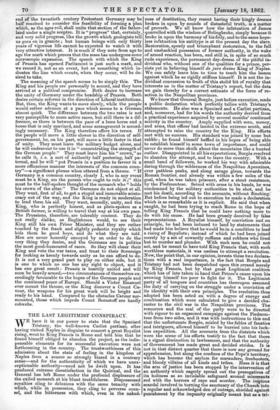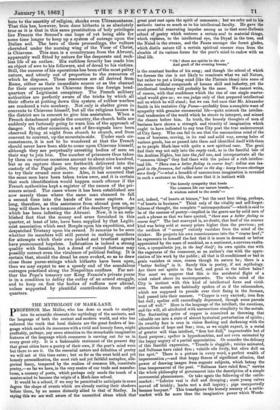THE LAST LEGITIMIST CONSPIRACY.
WE have it in our power to state that the Spaniard Tristany, the well-known Carlist partisan, after having visited Naples in disguise to concert a great Royalist rising, went to King Francis in Rome and told him that he found himself obliged to abandon the project, as the indis- pensable elements for its successful execution were not forthcoming in the country. The trustworthiness of this admission about the state of feeling in the kingdom of Naples from a source so strongly biased in a contrary sense—and for the authenticity of which we have unex- ceptionable authority—need not be dwelt upon. It has produced extreme dissatisfaction in the Quirinal, and the General has left Rome under the profound displeasure of the exiled monarch at his blunt truthfulness. Dispossessed royalties cling to delusions with the same tenacity with which, while in possession, they cling to perverse coun- sel, and the bitterness with which, even in the naked- ness of destitution, they resent having their kingly dreams broken in upon by sounds of distasteful truth, is a matter of proverb. We all know how the infatuation of James quarrelled with the wisdom-of Bolingbroke, simply because it broke in upon the harmony of his folly, and to the same hope- less infatuation his antitype is at the present day the slave. Restoration, speedy and triumphant restoration, to the full and unshackled possession of former authority, in the wake of armed reaction, has been, and still is, in spite of so much rude experience, the permanent day-dream of the pitiful in- dividual who without one of the qualities for a prince, per- sists yet in believing himself de jure divine King of Naples. We can safely leave him to time to teach him the lesson against which he so rigidly stiffens himself. It is not the in- dividual conversion to truth of this stolid bit of royalty that interests us in the matter of Tristany's report, but the data we gain thereby for a correct estimate of the force of re- action in the Neapolitan provinces. We know that General Borges, just before execution, made a public declaration which perfectly tallies with Tristany's statements. He also was a Spaniard and a Carlist partisan, and, moreover, had for his words the authority derived from a practical experience acquired by several months' continued activity in the country. Amply supplied with men, money, and arms, that officer had landed in the extreme south, and attempted to raise the country for the King. His efforts met with no success. His standard was joined by none but rabble ; he found himself baffled in his hopes of being able to establish himself in some town of importance, and could never do more than skulk about the mountains like a hunted outlaw. Disappointed in all his expectations, Borges resolved to abandon the attempt, and to leave the country. With a small band of followers, he worked his way with admirable daring through the wilderness of the Neapolitan Apennines, over pathless peaks, and along savage glens, towards the Roman frontier, and already was within a few miles of the goal, when he was taken prisoner, after a stout resistance, by the Piedmontese. Seized with arms in his hands, he was condemned by the military authorities to be shot, and he met his death, according to the accounts, without flinching. But before being led out to execution he made a declaration which is as remarkable as it is explicit. He said that when caught, be had been trying to reach Rome in the hope of telling King Francis that he could have nothing more to do with his cause. He had been grossly deceived by false representations. A Royalist himself, by conviction and on principle, lie had been induced to land by statements that had made him believe that he would be in a condition to lead a rising of Royalists ; instead of which be had been joined merely by a set of cowardly ruffians and robbers who lived but to murder and plunder. With such men he could not act, and he meant to have told King Francis that, with such worthless materials, it was useless to attempt a revolution. Now, the point that, in our opinion, invests these two declara- tions with a real importance, is the fact that Borges and Tristany had not been despatched upon this errand merely by King Francis, but by that great Legitimist coalition which has of late taken in hand that Prince's cause upon his avowing himself too poor to fight for it. The Legitimist party of all tongues and countries has thereupon assumed the duty of carrying on the struggle under a conviction of its identity with their own principles. The resolution thus adopted has been acted on with a degree of energy and combination which were calculated to give a decided cha- racter to the civil war in the Neapolitan provinces. The resources and the zeal of the party were to be directed with rigour to an organized campaign against the Piedmon- tese from two sides, and it was with instructions to this end that the unfortunate Borges, misled by the fables of fanatics and intriguers, allowed himself to be hurried into his luck- less expedition. All the accounts from the districts which were the scene of his efforts testify to the fact that there is a signal diminution in lawlessness, and that the authority of Government has made great and decided strides. It is not in that distant quarter that there is now any ground for apprehension, but along the confines of the Pope's territory, which has become the asylum for marauders, freebooters, and bloody villains of all kinds and tribes. Here it is that the arm of justice has been stopped by the intervention of an authority which eagerly spread out the prerogatives of its holiness as an inviolable safeguard around miscreants red with the horrors of rape and murder. The impious scandal involved in turning the sanctuary of the Church into a regular and acknowledged den of outrage, shielded against punishment by the impunity originally meant but as a tri- bute to the sanctity of religion, shocks even Ultramontanes. That this has, however, been done hitherto is as absolutely true as it is that in this same prostitution of holy privileges lies Francis the Second's one hope of yet being able for some time longer to keep up a system of outrage upon the Italian soil. The hero of these proceedings, the vulture cherished under the nursing wing of the Vicar of Christ, is Chiavone. This man is a countryman from the Abruzzi, apparently well fitted by nature for the desperate and reck- less life of an outlaw. His ruthless ferocity has made him an object of awe to his followers, and of dread to his victims. Still, the success of his operations has been of the most paltry nature, and utterly out of proportion to the resources of which he disposes. These resources are all derived from Rome, either as their immediate source or as the channel for their conveyance to Chiavone from the foreign head- quarters of Legitimist conspiracy. The French military authorities are perfectly aware of the tricks by which all their efforts at putting down this system of robber warfare are rendered a vain mockery. Not only is shelter given in convents to Chiavone himself, but all the religious houses in the district are in concert to give him assistance. When a French detachment patrols the country, the church bells are suddenly set furiously going to warn him of the approach of danger. On other occasions, a set of fire-signals have been observed flying at night from church to church, and from convent to convent, up the mountain-side. -Under such cir- cumstances, it is not to be wondered at that the French should never have been able to come upon Chiavone himself, although they are perpetually arresting bodies of men on their way to join him. The number of prisoners thus taken by them on various occasions amount to about nine hundred, but as on capture these are forthwith delivered into the custody of the Papal police, they are directly let out again to try their errand once more. Also, it has occurred that the same men have been taken twice over, and it is certain that such identification would happen much oftener if the French authorities kept a register of the names of the pri- soners seized. The cases where it has been established are now merely those where the same man chanced to fall a second time into the hands of the same captors. As long, therefore, as this assistance from abroad goes on, so long will there be a continuance of the desultory brigandage which has been infesting the Abruzzi. Now, it is an esta- blished fact that the money and arms furnished in this quarter, at least of late, have been supplied by that Legiti- mist association which sent Borges upon his expedition, and despatched Tristany upon his errand. It remains to be seen whether its members will still persist in making sacrifices for attempts which their own picked and trustiest agents have pronounced hopeless. Infatuation is indeed a strong quality with fanatics, but a dread of ruined fortune may possibly correct even the virulence of political feeling. It is certain that, should the dread be once evoked, so as to draw close those purse-strings which hitherto have been open, then we may expect to see a speedy end of the scandalous outrages practised along the Neapolitan confines. For nei- ther the Pope's treasury nor King Francis's private purse is in a condition to defray the outlay of an armed struggle, and to keep on foot the bodies of ruffians now abroad, unless supported by plentiful contributions from other quarters.































 Previous page
Previous page